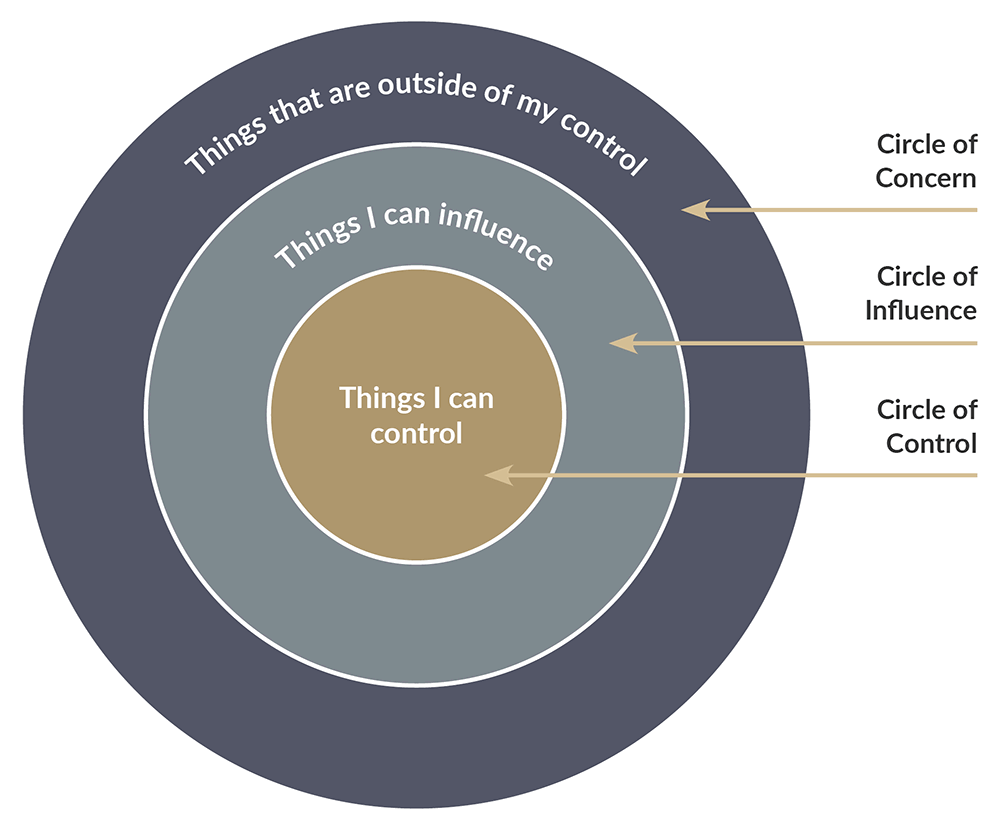Circles of Control and Victimhood
Our position in life comes from things we can and can't control. We tend to focus on the wrong part of that equation.
You may have heard the phrase “Fortune favors the prepared.” It sums up quite nicely the factors leading to one’s position in life at any given time: it’s a combination of forces outside of one’s control and the choices one has made - in other words, we only have so much control over our lives.
We’ve touched on this before - most notably in a post about helping others out in their careers because no one can get to where there are completely by themselves. One can make the best choices in life and still not get to their goal thanks to outside forces, and conversely people can make awful decisions and still get to the top (the all-too-common “failing up” phenomenon.)
Is Free Will Even Real?
In order to even enter the conversation about spheres of control, we need to first actually agree that humans have free will. It seems obvious - I choose what to do every day - but there’s actually entire philosophical schools dedicated to whether or not you and I actually make the choices we make, or if external factors make the choices for us.
We’re not talking about a Calvinistic determinism, but more along the lines of the mere illusion of choice in our everyday lives. It’s not that the future is pre-ordained, but that the choices we make are actually not choices at all, but driven solely by external factors outside of our control.
If you subscribe to this theory, you’re a strong determinist. This newsletter instead subscribes to soft determinism - the idea that we as humans have free will, but we are influenced by external factors like upbringing and genetics. These influences do not determine the outcome, but they certainly affect the choices we make.
Enter the Circles of Control
Now that we’ve established that external factors play a role (but are not the only role) in our choices, we can dive into another dichotomy in the free will equation: what we can control and what we can’t.
If you take the Stoicism view of spheres of control, there are simply two: what exists in your circle of control and what exists outside of it. In other words, there’s things you can control and things you can’t. End of story.
And while stoicism is a wildly popular philosophical school and can be partially credited with incredibly helpful psychological techniques like cognitive behavioral therapy (there’s a reason Marcus Aurelius’ Meditations is titled the way it is and continues to be relevant), the Stoics were missing what is today considered a crucial sphere of influence.
Outside of only things you can control (thoughts, judgements, emotions, etc.) and only things you can’t control (macroeconomics, the weather, traffic, etc.) is this gray area dubbed the circle of influence.

Inside the circle of influences lives things you can try to sway one way or the other, but over which you cannot control the outcome. This is where the phrase “Fortune favors the prepared” firmly lives.
The Five Ps Only Go So Far
I’ll never forget in a job interview I had years ago my wife had sent me an interesting article about something happening in that industry that I happened to read on the way there. I mentioned it in the interview to try to show that I had my finger on the pulse of the industry and the interviewer seemed to truly be impressed by it. While I have no evidence of it, I believe that I got that job because of that small piece of information I offered up in the interview. It was an excellent example of “Proper Preparation Prevents Poor Performance.” The sixth p - my partner - certainly gets credit here, too.
I retell this story because job interviews are an excellent example of something living in the circle of influence - we prep for them and put a lot of effort into them, but we ultimately have no control over their outcome.

And once we’ve secured the job, our careers and their trajectories are also something in the circle of influence - and this is a difficult pill to swallow. We like to think that we are in charge of our destinies; that hard work and diligent self-improvement will continue to lead to promotions and career ascendance.
But many of us know that’s not how it always goes. In fact, you could do everything right and still not get the promotion you wanted or the job you interviewed for thanks to factors a step beyond the circle of influence all the way out in the circle of concern. In fact, you need something from the circle of concern to break your way in order for the hard work you’re putting into the circle of control to pay off.
Take promotions, for example. In the agency world, there is a lot in the circle of control that you need to do: improve your hard skills, show growth in your soft skills. And then you can try to influence the next circle: show up for your coworkers, be a good team player, and be dependable for other departments. Do these things and you should be golden for a promo, right?
There’s that pesky circle of concern. The agency could be having a down quarter, or have unreachable annual targets, or have lost a pitch you had nothing to do with. And for that reason the promotion won’t go through. You need one of those things to break for you in order to actual secure the promotion that - were it only up to the first two concentric circles - you earned.
Don’t Be a Victim
So you miss out on the promotion, leaving you two choices. You can wallow in self-pity - angry at the agency, the holdco, the world - for missing out on the promotion you worked so hard for. And it’s a natural feeling - the fact that your career is driven not only by your effort, but also completely external forces, is infuriating. But it’s a reality that none of us can escape.
The second choice is to double-down on the circles of control and influence. Work harder to make it even more difficult to get passed up next time, volunteer for a pitch to help drive revenue for the company so promotion money is more bountiful, or polish up your resume, work your network, and find a new job where you feel closer to what you deserve.
This focus on things you can control (or at least influence) is the only fruitful, productive way forward. The bitterness and jadedness that come with consistent victimhood stemming from the circle of concern is not a quality workers look for in their managers or leaders - nor is it what managers and leaders look for in employees. Make sure you’re not hurting your chances in the circle of influence because of the things you can’t control in the circle of concern.
Grab Bag Sections
WTF Contentment: I find myself wracking my brain for something to complain about this week (which, if you know me, is wildly out of character.) Could this be what contentment feels like?
The kids are good - or, as good as toddlers can be. The girl is loving kindergarten and the boy is really coming into himself - they’re both making my wife and I laugh every day (when we’re not muttering “What the fuck” under our breath while watching them figure out life.)
Work is full of challenges, but challenges that are more the interesting type instead of the time-pressured rote ones. I’m not sure I could use the world “fulfilling” for an ad agency job, but it’s certainly been worse.
But here’s the thing about contentment (at least in my experience) - this is when that circle of concern rears its head and throws you some humble pie. It could be a kid’s illness, a setback at work, or something worse. All you can do is enjoy the ride and hope it lasts a while while maintaining focus on the circles of control and influence - in that order.
Album of the Week: It’s Q4 and the days are getting shorter even as the work hours are getting longer. So let’s hop over the pond and jump into a short album that has repeatability to help with those long workdays.
Jorja Smith came on the scene in the mid-2010s after a co-sign from previous AOTW recipient Maverick Sabre and Drake. She released her first studio album Lost and Found in the summer of 2018 to much critical acclaim. The follow up to that was this week’s album: Be Right Back. Technically an EP, the 8-track album was much anticipated after her freshman album, and it delivered.
There are no skips (which is essential to an EP.) The highlights are the opener in “Addicted” and “Bussdown,” which features a quality assist from Nigerian-British rapper Shaybo. Don’t gloss over “Time” or “Home” which get writing credits from Jorja’s original co-signer Maverick Sabre. Put this album on repeat to help get through the Q4 scaries.
Quote of the Week: “Of all men’s miseries the bitterest is this: to know so much and to have control over nothing.” - Herodotus
See you next week!






